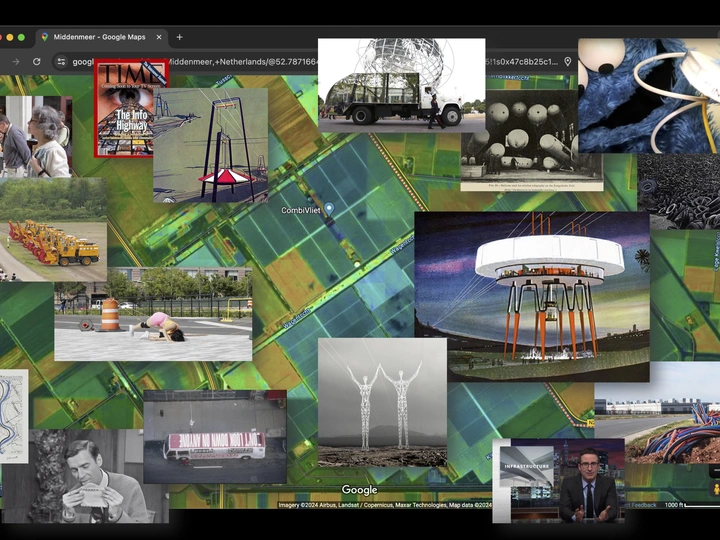Infrastructure Redux: actions on a networked world

Rebecca Billi
Karin de Wild
Steven Lauritano
"Reclaiming Infrastructures Lab" is a collective formed by architectural historian (Dr. Steven Lauritano), curator and specialist in museum studies (Dr. Karin de Wild), architect and researcher of urban cultures (Rebecca Billi) and programmer and researcher in media studies (Inaya Basu).
We came together in January 2024 around a shared commitment to raising awareness about infrastructural challenges and infrastructural opportunities. Our goal is to plan, curate, and design a first-of-its kind exhibition dedicated to infrastructural interventions by artists and designers. Too often digital infrastructures are treated as separate entities from the physical networks that support and manage the flow of human and non-human bodies, goods, energy, water and waste across the surface of the planet. Our collective aims to eliminate this divide with specialists in digital culture (de Wild and Bayu) working alongside specialists in architecture (Lauritano and Billi).
We draw inspiration from a research seminar on "Infrastructure, Art, and Culture" taught by Lauritano with assistance from Billi at Leiden University College in The Hague (see section 4.2 for more information). For the past three years students have been studying art and design practices that install their work within infrastructural networks and spaces. By reclaiming and acting on these systems artists draw public attention to infrastructures and highlight untapped opportunities for transformation, more equitable use and improved ecological responsibility.
We are developing a platform to share the knowledge and creativity displayed in these works. However, many artists' infrastructural actions pose unique curatorial challenges due to their embeddedness. To imagine display strategies that engage audiences locally and virtually, we lean on the expertise of de Wild and Bayu. De Wild's past work with JODI and her research on curating internet art provide the conceptual foundation for our exhibition plans.
In a 2015 episode of Last Week Tonight, comedian John Oliver defined infrastructure as “our roads, bridges, dams, levees ... basically anything that can be destroyed in an action movie.” (Picture the ensuing montage complete with laugh track). Infrastructure, however, is no joke! It demands critical attention and creative intervention.
"Infrastructure Redux: actions on a networked world" comprises a series of events (conversations, workshops, site visits and curatorial charrettes) leading up to a first-of-its-kind exhibition on infrastructure. We will involve artists and designers whose work engages the vast networked systems facilitating the flow of bodies, goods, energy, data, water and waste.
The project is motivated by what we perceive to be a crisis in infrastructural literacy. Years ago, most people had a basic understanding of infrastructures: how a letter gets from one’s mailbox to a distant relative, how fuel is extracted and delivered to heat one’s home. As logistics, data, and waste infrastructures have grown more international and technologically complex, that level of basic understanding has disappeared, and with it, the agency to call for change in the system when needed.
We are currently planning a series of events co-hosted by Leiden University which will bring together architects, artists and ecologists to share knowledge and develop curatorial models for the exhibition. Focusing on logistics, data, and waste infrastructures, respectively, each event will also involve representatives from institutions (Nieuwe Instituut, Varia, Waag Futurelab) who share an investment in these themes.
As LINA fellows, we would be able to interact with an even broader cross-section of designers and researchers who are confronting infrastructural challenges and reimagining the networked architectures that play an integral role in addressing our most pressing global challenges, like climate change, food scarcity and cyber security.